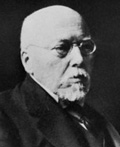Originated from the family of state officials; studied philisophiy in the universities of Münster, Munich and Berlin. He became a prominent Catholic scholar and an authority on medieval scholasticism. As a representative of the Catholic Centre Party, Hertling was a deputy of the Reichstag in 1875-1890. In 1876 he was one of the co-founders of the Görresgesellschaft zur Pflege der Wissenschaft im katolischen Deutschland, a Catholic society for the support of science. Living in Bavaria since 1882, Hertling refused to run for the parliamentary seat in 1890, but remained politically active. In 1896-1912 Hertling again was a Reichstag member and headed the Center parliamentary group in 1909-1912. He accepted the nomination made by the Prince Regent Luitpold and left the Reichstag to become state minister of the royal court and foreign affairs, chairman in the Council of Ministers of Bavaria (9 Feb 1912 - 10 Nov 1917). In July 1917, Hertling hesitated to accept the nomination to the office of Reich Chancellor vacated with the resignation of Theobald von Bethmann Hollweg, but when the short-lived cabinet of Georg Michaelis fell in October, Hertling agreed to replace him as head of government and president of the Prussian state ministry. However, the aged chancellor had little power, which remained in the hands of the German supreme military command. The introduction of a new parliamentary system in the German Reich announced by the Emperor Wilhelm II on 30 Sep 1918 was followed by the resignation of Hertling, who died in three months. Biography source: [1][2][3] |

